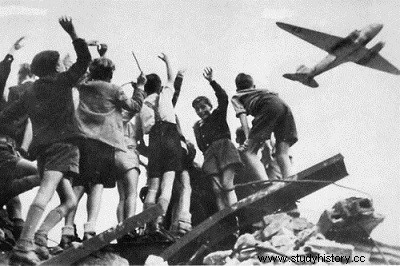
The crisis erupted over monetary reform. A sound currency was essential for Germany's economic recovery. Throughout the winter of 1947-1948, the four great powers discussed the possibilities of a new currency for Germany. The talks came to nothing. The United States and Great Britain then decided to carry out a reform in their own areas, hoping that France would follow their example. Which she did.
The final decision was taken in London, where a conference brought together the only Western powers:In June 1948, the Soviet representatives on the Allied Control Council demanded a full report of the deliberations; the Westerners refused; the entire Soviet delegation then left the council, and its leader, Marshal Sokolovsky, declared that it had now ceased to function. A few days later, the first trains going to West Berlin were stopped by the Soviets and forced to turn around.
It was still just an incident. It was only a question of roadblocks, not of blockades. Did Moscow want to force Westerners to leave Berlin? Or was he content to use Berlin as a means of pressure on the West?
At first the Soviets probably acted to obstruct; they were probably in a bellicose mood, but little more. And the reactions of Westerners were confused and hesitant. The blockade could have remained in an embryonic state. At this stage, the crisis could still have been avoided. But the Soviets, in the meantime, had probably changed their minds. Access to West Berlin was again blocked and, in response, the West organized an airlift. The crisis escalated and both sides realized they were caught in a decisive showdown. Not only was escalation possible, total blockade became a reality.
While admitting that the Soviet authorities and the Communist leaders of the eastern zone did not want to drive Western forces out of Berlin, they wanted at least to demonstrate to the people of West Berlin that Westerners could only remain there with their permission. And by political pressure and material advantages, they tried to conciliate the population. On the one hand, its elected representatives were intimidated; on the other hand, the Soviet authorities offered large rations of food and fuel to any West Berliner who would enroll in this direction in East Berlin.
We must pay tribute here to the courage of the people of West Berlin because even at the height of winter, in this city still in ruins, where the number of old people and children was abnormally high, only 2% of the population registered.
